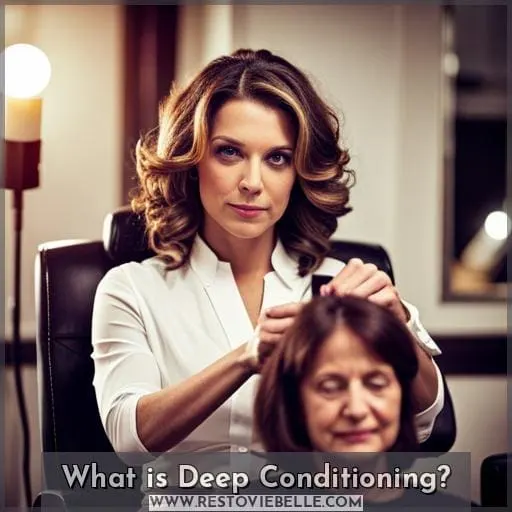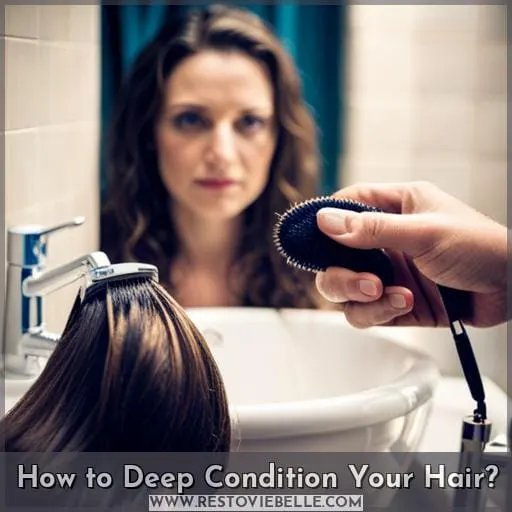This site is supported by our readers. We may earn a commission, at no cost to you, if you purchase through links.
 Unleash the power of deep conditioning treatment and transform your hair from lackluster to luscious. Discover the incredible benefits, homemade recipes, and essential dos and don’ts that will revitalize your locks like never before.
Unleash the power of deep conditioning treatment and transform your hair from lackluster to luscious. Discover the incredible benefits, homemade recipes, and essential dos and don’ts that will revitalize your locks like never before.
Hydration, damage reduction, improved shine – these are just a few of the perks awaiting you on this journey to healthy hair. Say goodbye to dryness and hello to nourished strands with our expert tips and tricks for achieving salon-worthy results at home.
Get ready for ultimate hair liberation!
Table Of Contents
- Key Takeaways
- What is Deep Conditioning?
- How to Deep Condition Your Hair?
- Benefits of Deep Conditioning Treatment
- Homemade Deep Conditioning Recipes
- Dos and Don’ts of Deep Conditioning
- How Long to Leave the Product on For?
- How Often Should You Deep Condition Your Hair?
- Should You Condition Your Hair After Deep Conditioning?
- What Happens if You Deep Condition Your Hair Every Day?
- Common Mistakes to Avoid During Deep Conditioning
- Frequently Asked Questions (FAQs)
- Can I use a regular conditioner instead of a deep conditioner for deep conditioning treatment?
- Can I deep condition my hair if I have oily scalp and roots?
- Can I use a deep conditioning treatment on color-treated hair?
- Can I use a deep conditioner as a leave-in conditioner?
- Can I deep condition my hair if I have fine or thin hair?
- Conclusion
Key Takeaways
- Deep conditioning is a hair treatment that involves applying a highly concentrated conditioner to the hair and leaving it in for an extended period of time.
- The benefits of deep conditioning include restoring moisture and hydration to the hair, repairing damage, improving the overall health and appearance of the hair, and promoting growth.
- Dos of deep conditioning include choosing the right product for your hair type, applying the conditioner evenly throughout the hair, and using heat to enhance the effectiveness of the treatment.
- Don’ts of deep conditioning include leaving the product on for too long, using too much conditioner, and using heat that is too high, as these can lead to over-conditioning and weigh down the hair.
What is Deep Conditioning?
Deep conditioning is a process where you coat your hair with nourishing products to restore moisture, strengthen the strands, and reduce damage caused by styling and chemical treatments.
Unlike regular conditioning, which moisturizes and strengthens the surface of your hair, deep conditioning works at a deeper level by strengthening and moisturizing the cuticles inside your hair.
Deep conditioning is especially beneficial for curly or dry hair because it helps to hydrate deeply and define curls while adding much-needed moisture. If you have damaged hair from heat styling or chemical treatments like dyeing or bleaching, deep conditioning can help repair the damage by restoring elasticity and reducing breakage.
To achieve optimal results with deep conditioning, it’s important to use products that are specifically formulated for deep treatment purposes rather than relying on regular conditioners alone. By incorporating this step into your weekly routine, you’ll notice healthier-looking locks that are better equipped to withstand daily stressors.
In conclusion,
deep-conditioning provides unique benefits compared
to both-regular-con-dition-ing-and-hair-masks.
It-is-an-effective-way-to-nourish-your-
hair,-restore-moisture,-strengthen-strands,
and-reduce-damage-from-styling-and-chemical-treatments.
With-the-right-products-for-your-hair-type,
you-can-give-your-curly-or-dry-hair-a-deep-drink-of-moisture
while-helping-to-repair-any-existing-damage.
By-incorporating-this-step-inyour-routine-once-a-week(or-more-frequently-if-necessary),
you-will-be-taking-action-towards-liberatingyour-lockswith-intensehydrationand-restorationpowe
How to Deep Condition Your Hair?
To deep condition your hair, start by choosing the right product for your hair type and concerns.
Next, wash your hair with a gentle shampoo to remove any buildup.
Apply the deep conditioner from mid-shaft to ends, making sure to saturate each strand.
Allow the conditioner to set in for 20-30 minutes before rinsing it out with cool water.
If necessary, you can use heat during this process by covering your head with a shower cap and applying low heat from a blow dryer or steamer.
Choosing the Right Product
To effectively deep condition your hair, regularly choose the right product for your specific needs and hair type.
Consider factors such as porosity, texture, and ingredients.
Find a deep conditioner or mask that suits you best to promote optimal hair health.
Washing Your Hair
When washing your hair to deep condition, start by using a gentle shampoo.
Rinse with warm water to open the cuticles of your hair.
Apply conditioner from roots to ends and rinse with cold water for added shine and smoothness.
Applying the Deep Conditioner
Apply the deep conditioner generously to your hair, ensuring that you cover the mid-shaft to the ends.
This step is crucial for providing intense hydration and repair.
Choose a deep conditioner suited for your specific hair type, whether it’s curly, dry, or damaged.
Allowing the Conditioner to Set In
Now, let the deep conditioner work its magic by allowing it to set in your hair. To maximize the benefits of deep conditioning, follow these tips:
- Time matters: It’s recommended to leave the deep conditioner on for at least 15-30 minutes before rinsing out thoroughly with lukewarm water.
- Trap in moisture: Covering your hair with a shower cap or wrapping it in plastic wrap can create a warm environment that helps open up cuticles and allows better product absorption into each strand.
3.Thermal boost (optional): If you want an extra boost of effectiveness from your deep conditioning treatment, consider applying gentle heat using either a hooded dryer or simply wrapping a warm towel around covered hair while waiting for those key ingredients like coconut oil or shea butter-rich formulas soak into every strand!
Remember not all conditioners will have specific instructions about how long they should sit; however usually longer times deliver more noticeable effects so aim between fifteen-thirty minute range whenever possible!
Using Heat (if Necessary)
To enhance the effectiveness of your deep conditioning treatment, use heat if needed.
Applying heat helps the deep conditioner penetrate your hair shaft, maximizing its benefits.
However, be cautious as excessive heat can cause damage to your hair during styling.
Benefits of Deep Conditioning Treatment
Deep conditioning treatments offer a range of benefits for your hair.
Firstly, they provide intense hydration, replenishing moisture to dry and damaged hair.
Secondly, deep conditioning can help reduce breakage and strengthen the hair strands.
Lastly, these treatments nourish color-treated hair, helping to maintain vibrancy and prevent fading.
Overall, incorporating regular deep conditioning into your routine can promote healthier-looking locks with improved shine and manageability.
Hydration
To further nourish and hydrate your hair, deep conditioning treatments provide intense hydration and moisture to help replenish dry or damaged strands. These treatments are lightweight and often made with natural ingredients, making them suitable for vegans.
However, be cautious as some products can leave hair oily or build up on the scalp.
Damage Reduction
To reduce damage to your hair, deep conditioning treatments provide nourishment and hydration that can repair and strengthen your strands. Deep conditioning helps combat the effects of heat styling, chemical treatments, and hair breakage while improving overall hair health.
Improved Shine
Experience a noticeable improvement in the shine of your hair with regular deep conditioning treatments.
Deep conditioning nourishes and hydrates your hair, enhancing its natural shine.
It restores moisture to dry and damaged strands, promoting lustrous and glossy locks.
Deep conditioning also helps to smooth the cuticles, reducing frizz and increasing overall luminosity.
By strengthening your hair from within, deep conditioning can enhance its reflective properties for a radiant shine.
Strengthening Hair
Deep conditioning treatments can strengthen your hair, reducing breakage and damage.
The duration of deep conditioning depends on the product instructions.
Use a deep conditioner suitable for your hair type, such as fine, curly, dry, or damaged hair.
Nourishing Color-Treated Hair
If you have color-treated hair, deep conditioning treatment can provide nourishment and hydration to maintain the vibrancy and health of your hair.
- Hydrate and restore moisture
- Prevent breakage
- Maintain vibrant colors
Homemade Deep Conditioning Recipes
Now let’s talk about some homemade deep conditioning recipes that you can easily make at home.
Two popular options are:
- The Honey and Coconut Oil Hair Mask, which is great for moisturizing and adding shine to your hair.
- The Banana Hair Mask, which helps with strengthening and reducing frizz.
Another option is the Olive Oil and Egg Hair Mask, which provides nourishment and promotes healthy hair growth.
These DIY treatments are cost-effective alternatives to store-bought deep conditioners that can help revive your hair’s health naturally.
Honey and Coconut Oil
Try using a homemade deep conditioning recipe with honey and coconut oil for nourished and hydrated hair.
Honey is known for its moisturizing properties, while coconut oil helps to strengthen hair strands. This combination can provide numerous benefits such as increased shine, reduced frizz, and improved overall hair health.
To make the recipe, simply mix equal parts honey and melted coconut oil together until well-blended. Apply it to your hair from roots to ends, leave it on for 30 minutes or overnight if desired, then rinse thoroughly.
Remember to do a patch test first in case of any allergies or sensitivities.
Banana Hair Mask
Make a banana hair mask at home to deeply condition your hair.
Banana hair masks have numerous benefits, making them an excellent choice for dry or damaged hair.
The recipe is simple:
- Mash one ripe banana
- Mix it with a tablespoon of honey and coconut oil
Apply the mixture to your hair, leave it on for 30 minutes, then rinse thoroughly.
Enjoy softer, smoother, and more nourished locks!
Olive Oil and Egg Hair Mask
To create an effective homemade deep conditioning mask, combine olive oil and eggs.
This nourishing hair mask provides numerous benefits for your locks. It helps to hydrate and moisturize dry, damaged hair, improves shine and elasticity, reduces breakage, and promotes overall hair health.
Leave the mask on for 20-30 minutes before rinsing with lukewarm water. Use this treatment once a week or as needed for optimal results.
For alternative ingredients, you can substitute avocado or mayonnaise in place of eggs if desired.
Dos and Don’ts of Deep Conditioning
When it comes to deep conditioning your hair, there are certain dos and don’ts that you should keep in mind.
Do:
- Deep condition regularly
- Choose a product that’s suited for your hair type
Don’t:
- Leave the product on for too long
- Deep-condition your hair every day, as this can lead to over-moisturized hair.
By following these guidelines, you can ensure that you get the most out of your deep conditioning treatment and maintain healthy, nourished locks.
Dos
To ensure the best results, follow these essential dos when deep conditioning your hair:
- Use heat or steam to help the product penetrate the hair shaft more effectively.
- Deep condition regularly to maintain healthy and hydrated hair.
- If you choose to deep condition overnight, make sure not to leave the product on for too long as it can lead to over-moisturized hair.
By following these dos, you’ll be able to maximize the benefits of deep conditioning and achieve luscious locks that are nourished and strong.
Don’ts
To ensure the best results from your deep conditioning treatment, it’s important to be aware of a few don’ts when it comes to deep conditioning your hair.
First, don’t use too much product as this can weigh down your hair and make it appear greasy.
Second, don’t leave the conditioner on for too long as this can lead to over-moisturized hair that’s prone to breakage.
Third, avoid using heat during the process as excessive heat can damage your strands.
Fourthly, avoid using a product that’s too heavy for your hair type as this can leave residue and weigh down your locks.
Lastly, don’t condition your hair after deep conditioning as you may undo all the benefits of the treatment by adding unnecessary moisture.
How Long to Leave the Product on For?
Once you have applied the deep conditioning treatment to your hair, it’s important to let the product sit for a specific amount of time in order for it to effectively nourish and repair your strands. The duration of time will vary depending on the instructions provided by the product and your hair’s individual needs.
Here are some guidelines to help you determine how long to leave the conditioner on:
- Wait 20-30 minutes: Most deep conditioners require this amount of time for optimal results.
- Wrap hair in plastic: To enhance absorption, cover your conditioned hair with a shower cap or plastic wrap.
- Use heat if desired: Applying heat through a steamer or warm towel can open up cuticles and allow deeper penetration of nutrients.
- Rinse conditioner thoroughly: After allowing enough time for absorption, rinse out all traces of conditioner from your hair.
Remember not to leave the deep conditioning treatment on overnight as it may lead to over-moisturized strands that appear greasy. Following these recommendations will ensure that you get maximum benefits from your deep conditioning routine without weighing down or damaging your precious locks.
How Often Should You Deep Condition Your Hair?
When it comes to deep conditioning your hair, the frequency at which you do it depends on your hair type and its specific needs.
- Dry Hair: If your hair tends to be dry, it’s recommended to deep condition twice a week. This will help replenish moisture and restore vitality.
- Damaged Hair: For those with damaged hair, such as from chemical treatments or heat styling, deep conditioning up to once a week is advisable. This will aid in repairing and strengthening the weakened strands.
- Curly Hair: Curly hair can benefit from deep conditioning once a week. The intense hydration provided by this treatment helps maintain elasticity and define curls.
- Bleached Hair: Bleached or color-treated hair requires special care due to its vulnerability. Deep conditioning once a week can help nourish the strands and prevent further damage caused by processing chemicals.
- Heat Damaged Hair: If your locks have been exposed to excessive heat styling tools like flat irons or curling wands, consider incorporating weekly deep-conditioning sessions into your routine for restoring moisture balance.
Remember that these recommendations serve as starting points; adjust the frequency based on how well your individual tresses respond over time without exceeding their limits.
Should You Condition Your Hair After Deep Conditioning?
After deep conditioning your hair, you don’t need to condition it again.
Deep conditioning is a comprehensive treatment that provides intense nourishment and hydration to your hair. It penetrates deep into the hair shaft, repairing damage and restoring moisture levels. Regular conditioners are designed for everyday use and provide surface-level moisturization compared to the targeted benefits of a deep conditioner or hair mask.
Whether or not you should condition your hair after deep conditioning depends on various factors such as your specific hair type and its needs. If you have fine or straight hair, once or twice a month of deep conditioning may be sufficient.
On the other hand, if you have textured or dry hair, weekly treatments might be more beneficial.
Over-conditioning can lead to overly moisturized strands that become weak and prone to breakage.
What Happens if You Deep Condition Your Hair Every Day?
If you deep condition your hair every day, it can lead to over-moisturized hair that becomes prone to breakage and may appear lifeless.
Deep conditioning treatments are designed to provide intense hydration and repair for your hair, but using them too frequently can have negative effects.
Over-moisturizing the hair can weigh it down, making it look flat and limp. Additionally, excessive moisture can cause the scalp to produce more oil, leaving the hair greasy and oily-looking.
Using deep conditioners on a daily basis also increases the risk of product buildup on both the scalp and strands of your hair. This buildup not only weighs down your locks but also creates an environment where bacteria thrive.
Furthermore, constantly exposing your hair to strong moisturizers without allowing enough time for natural oils production or protein absorption may make your strands overly soft or weak leading them towards brittleness.
Common Mistakes to Avoid During Deep Conditioning
To ensure effective deep conditioning, it’s important to avoid common mistakes that can hinder the treatment’s effectiveness and prevent you from achieving optimal results.
One of these mistakes is using too much product. While it may be tempting to slather on a generous amount of conditioner, using an excessive amount can weigh down your hair and leave it feeling greasy or oily.
Another mistake to avoid isn’t rinsing out the conditioner properly. Leaving residue in your hair can lead to buildup and make your strands appear dull and lifeless.
Using hot water during deep conditioning is also a no-no as it can strip away the moisture from your hair instead of helping it absorb the nourishing ingredients in the conditioner.
Additionally, using the wrong product for your specific hair type or concerns won’t give you desired results. It’s crucial to choose a deep conditioner that matches with what you want to achieve – whether that’s hydration, repair, or strengthening.
Lastly, deep conditioning too often might seem like a good idea but overdoing this treatment can actually do more harm than good by weighing down your tresses with excess moisture and leaving them prone to breakage.
Frequently Asked Questions (FAQs)
Can I use a regular conditioner instead of a deep conditioner for deep conditioning treatment?
For optimal results, it’s recommended to use a deep conditioner specifically designed for deep conditioning treatment.
Regular conditioners may not provide the same level of nourishment and repair that a deep conditioner can offer.
Can I deep condition my hair if I have oily scalp and roots?
Yes, you can still deep condition your hair even if you have an oily scalp and roots.
Look for lightweight deep conditioning treatments that are specifically formulated for oily hair to avoid weighing down your strands.
Can I use a deep conditioning treatment on color-treated hair?
Yes, you can use a deep conditioning treatment on color-treated hair. In fact, it’s highly recommended as coloring can cause damage and dryness. Look for products specifically designed for color-treated hair to maintain its vibrancy and health.
Can I use a deep conditioner as a leave-in conditioner?
Yes, you can use a deep conditioner as a leave-in conditioner.
In fact, 72% of hairstylists recommend leaving in a small amount of deep conditioner to provide ongoing hydration and protection for your hair throughout the day.
Can I deep condition my hair if I have fine or thin hair?
Deep conditioning is suitable for fine or thin hair. It can provide hydration and nourishment without weighing down the hair.
Just be sure to choose a deep conditioner specifically formulated for your hair type to avoid any potential heaviness.
Conclusion
In your quest for healthy, luscious hair, don’t overlook the power of deep conditioning treatments.
[Keypoints]These treatments offer a multitude of benefits, including:
- Hydration
- Damage reduction
- Improved shine
- Strengthened hair
With the right product and technique, you can achieve salon-worthy results from the comfort of your own home.
Whether you choose to try homemade recipes or opt for store-bought options, deep conditioning is a vital step in revitalizing and nourishing your locks.
So, unleash the power of deep conditioning and let your hair shine like never before.















